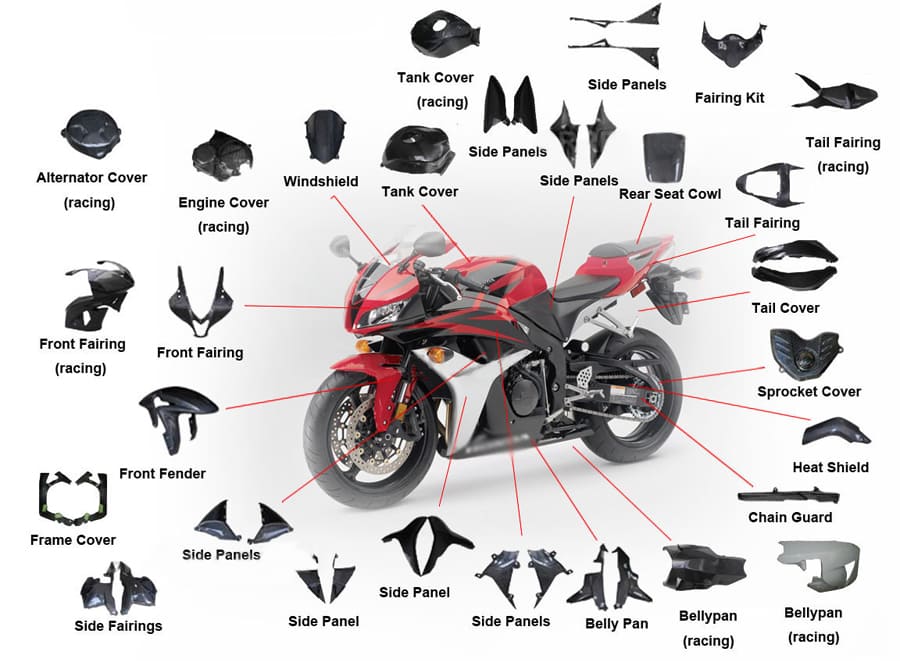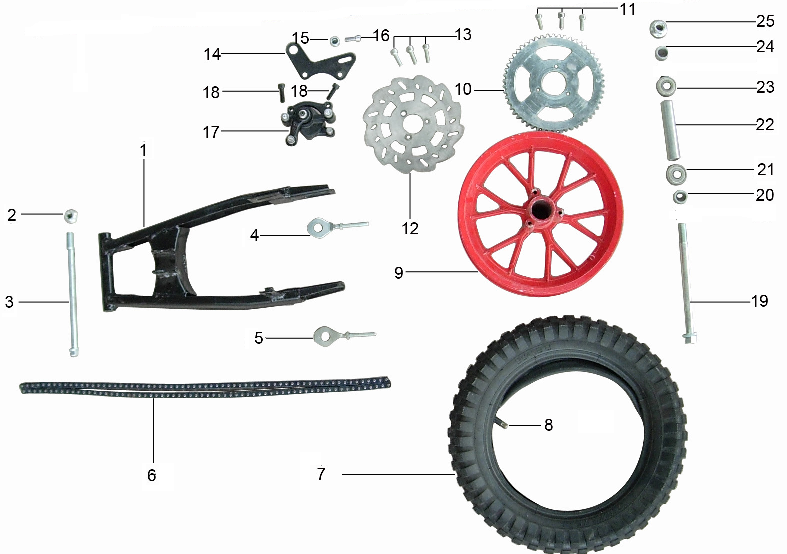A DIY Checklist for Keeping Your Motorcycle Spares Christchurch in Peak Shape
A DIY Checklist for Keeping Your Motorcycle Spares Christchurch in Peak Shape
Blog Article
Discover the Important MotorBike Parts You Required for Optimal Performance
Recognizing the crucial parts of a motorcycle is fundamental for attaining peak performance. Each component, from the engine to the braking system, plays an essential function in general performance and security. Regular upkeep can protect against unforeseen failings and improve the riding experience. Numerous riders overlook the details of these systems. Finding exactly how they collaborate can lead to a more reliable ride. What important components should every cyclist focus on?
The Engine: The Heart of Your Motorbike
The engine offers as the core element of a motorbike, driving its performance and specifying its capacities. It is responsible for converting fuel right into power, which powers the bike forward. Different sorts of engines are utilized, including single-cylinder, V-twin, and inline configurations, each offering distinct attributes fit for various riding functions and designs. The engine dimension, generally determined in cubic centimeters (cc), significantly affects performance, with larger engines normally providing even more power and torque.Furthermore, the engine's design and technology, such as gas injection systems or air-cooling versus liquid-cooling, influence performance and dependability. Upkeep is essential for peak procedure; factors like normal oil adjustments and checking spark plugs assurance longevity. Motorcyclists commonly think about an engine's responsiveness and level of smoothness, as these attributes boost the general riding experience. Inevitably, the engine remains a critical component that specifies not just the bike's efficiency however likewise the rider's connection to the device.
The Transmission: Changing Gears Efficiently
The transmission plays a crucial duty in a motorcycle's performance, particularly in the mechanics of equipment changing. Understanding how to move gears smoothly can boost the overall riding experience, while normal maintenance assurances peak capability. Proper focus to these facets can greatly impact the longevity and performance of the bike.

Equipment Shifting Mechanics
Smooth gear moving is necessary for excellent motorbike performance, greatly influencing both acceleration and control. The technicians of gear changing include the interaction in between the clutch, equipment lever, and transmission system. When a rider engages the clutch, it disengages the engine from the transmission, permitting a gear change without harming the parts. A well-timed release of the clutch, combined with precise activity of the gear lever, helps with a seamless adjustment between gears. This process assures that the engine operates within its best power band, enhancing efficiency. Motorbike Components NZ. Furthermore, recognizing the equipment proportions and their effect on speed and torque can aid bikers make notified choices during changes, eventually adding to a more responsive and enjoyable riding experience
Maintenance Tips Importance
Regular maintenance plays an important role in guaranteeing that the transmission system runs effectively, enabling smooth equipment shifts. Frequently changing the transmission and examining fluid is crucial, as old liquid can result in enhanced friction and wear. Furthermore, evaluating the clutch for wear warranties peak interaction and disengagement, avoiding slippage throughout gear modifications. Lubrication of moving parts is equally crucial to minimize rubbing and improve performance. Motorbike proprietors ought to also keep an eye on for leaks and uncommon noises, as these can suggest underlying issues. By adhering to these upkeep ideas, motorcyclists can prolong the life-span of their transmission system, assuring that gear changes stay smooth and adding to the overall performance of their motorcycle.
The Braking System: Ensuring Security on Every Trip
Braking systems are essential parts that straight affect a motorcycle's safety and security and performance. They include various parts, including brake pads, rotors, calipers, and hydraulic lines, all working with each other to guarantee efficient slowdown. The kind of stopping system-- generally either disc or drum-- impacts responsiveness and stopping power.Regular upkeep is important to support peak efficiency; worn brake pads can cause decreased effectiveness and increased quiting distances. In addition, the high quality of brake liquid must be monitored, as it can take in moisture over time, jeopardizing braking efficiency.Riders need to likewise think about the importance of anti-lock braking systems (ABS), which avoid wheel lockup during sudden stops, enhancing total safety. Correctly operating brakes are not almost stopping; they impart confidence in the biker, enabling much safer navigating via various surfaces. Eventually, a reputable stopping system is critical for delighting in every ride with satisfaction.
The Suspension: Enhancing Comfort and Control
A well-functioning suspension system considerably adds to a motorbike's overall efficiency, matching the performance of the stopping system. The suspension plays a considerable role in soaking up shocks from unequal surface areas, ensuring a smoother experience while maintaining tire call with the roadway. This contact is vital for both security and control, allowing motorcyclists to navigate edges with confidence and precision.Different kinds of suspension systems, such as telescopic forks or mono-shocks, supply differing levels of comfort and handling. Correctly tuned suspension improves responsiveness, offering the motorcyclist with a more connected feeling to the motorbike. Normal upkeep checks are necessary to ascertain the suspension components, consisting of dampers and springs, are functioning at their best. A reliable shock absorber not just elevates the riding experience but likewise adds to the long life of other motorcycle components by reducing deterioration. As an outcome, purchasing quality suspension is crucial for any type of serious motorcycle enthusiast.
The Tires: Connecting You to the Road
Tires play a crucial duty in a motorcycle's performance, working as the key link between the motorcyclist and the roadway. Recognizing see it here the different sorts of tires available can considerably influence managing and safety. In addition, routine upkeep is crucial to ensure peak tire efficiency and page longevity.
Tire Types Explained
Just how do various tire kinds affect a motorbike's efficiency? Tire kinds play an essential duty in establishing a motorcycle's grasp, security, and handling. Sport tires, made for high performance, deal improved grip and responsiveness on smooth roads, making them optimal for competing and aggressive riding. On the other hand, visiting tires prioritize sturdiness and convenience, providing a smoother adventure for long-distance traveling. Off-road tires, identified by their tough walk patterns, master traction on unpaved surface areas, appropriate for adventure fanatics. Furthermore, dual-sport tires blend attributes from both on-road and off-road categories, satisfying flexible riding needs. Eventually, selecting the best tire kind is necessary for maximizing performance, guaranteeing safety, and enhancing the general riding experience.
Maintenance Tips Offered
While riding when driving, keeping suitable tire condition is important for safety and performance. Routinely examining tire stress is essential, as under-inflated tires can bring about inadequate handling and raised wear. It is recommended to check tread deepness regularly; worn tires concession hold and security. Furthermore, cyclists should look for signs of damages, such as splits or bulges, which can indicate the requirement for substitute. Rotating tires periodically guarantees also put on, enhancing longevity. Moreover, keeping tires tidy from debris and staying clear of extreme curbs can prolong their life expectancy. Finally, keeping appropriate placement and balance adds to come to a head performance, reducing anxiety on various other bike parts. Sticking to these upkeep tips will Get More Info significantly boost the general riding experience.
The Gas System: Fueling Performance and Performance
The gas system plays a vital role in optimizing a motorcycle's efficiency and effectiveness, as it assures the optimal shipment of gas to the engine. It makes up a number of critical components, including the fuel tank, fuel pump, fuel filter, and fuel injectors or carburetor. Each component must operate efficiently to assure a smooth and powerful ride.The fuel storage tank shops fuel and supplies it to the engine using the fuel pump, which generates the essential pressure. A fuel filter avoids contaminants from entering the engine, while the injectors or carburetor mix gas with air for combustion.Proper upkeep of the fuel system is critical; a clogged filter or malfunctioning injector can result in lowered efficiency and increased fuel consumption. By validating that the fuel system operates efficiently, riders can enjoy enhanced throttle response, better gas economy, and in general enhanced riding experience.
The Electric System: Powering Your Ride
An effective electric system is essential for the total functionality and safety of a motorcycle, as it powers vital parts such as the ignition, illumination, and various digital systems. This system consists of the battery, which stores energy, and the generator, in charge of generating power while the engine runs. The circuitry harness links these components, ensuring reliable power distribution.Additionally, merges protect the system from overloads, while relays assist manage high-current tools with low-power signals. A properly maintained electric system improves performance by ensuring smooth begins and constant operation of lights and signals, essential for cyclist visibility and safety.Regular checks of the battery's charge and connections are essential for avoiding electrical failures. Motorcyclists ought to additionally inspect circuitry for damage, making certain all components function preferably. Inevitably, a robust electric system contributes substantially to the overall efficiency and reliability of the motorbike.
Regularly Asked Concerns
Exactly how Often Should I Change My Motorcycle's Battery?
The regularity of bike battery substitute relies on use and maintenance (Motorcycle Parts Auckland). Typically, batteries need to be changed every 3 to 5 years. Normal checks can aid recognize when a replacement is required for peak performance
What Devices Do I Need for Fundamental Bike Maintenance?
For fundamental motorbike maintenance, one calls for crucial devices such as a socket set, wrenches, screwdrivers, pliers, tire pressure gauge, and a torque wrench. These devices assist in effective maintenance and guarantee the motorbike runs effectively and safely.
How Can I Enhance My Motorcycle's The rules of aerodynamics?
To enhance bike the rules of aerodynamics, one need to take into consideration readjusting fairings, utilizing windscreen extensions, maximizing body setting, and minimizing general weight. These adjustments help reduce drag, improving stability and gas efficiency throughout rides.
What Are the Signs of a Failing Electrical System?
Signs of a failing electric system consist of dimming lights, trouble starting, uneven tool analyses, and blown merges. Bike Parts Wellington. Unusual smells or rust around battery terminals may additionally show underlying concerns requiring prompt interest for security and efficiency

Just how Do I Choose the Right Oil for My Motorcycle?
When picking oil for a motorcycle, one need to take into consideration the manufacturer's requirements, thickness scores, and the kind of riding. In addition, artificial versus traditional oil can impact efficiency and engine protection, influencing the choice substantially. The engine dimension, usually determined in cubic centimeters (cc), substantially influences efficiency, with larger engines typically giving even more power and torque.Furthermore, the engine's style and innovation, such as gas injection systems or air-cooling versus liquid-cooling, affect performance and dependability. A well-functioning suspension system significantly adds to a motorbike's overall performance, enhancing the effectiveness of the braking system. The fuel system plays an essential role in making best use of a motorcycle's performance and efficiency, as it ensures the ideal distribution of gas to the engine. A fuel filter avoids contaminants from getting in the engine, while the injectors or carburetor mix fuel with air for combustion.Proper upkeep of the fuel system is important; a clogged filter or malfunctioning injector can lead to lowered efficiency and increased gas usage. A well-maintained electrical system enhances performance by making sure smooth beginnings and consistent procedure of lights and signals, vital for motorcyclist visibility and safety.Regular checks of the battery's charge and connections are important for preventing electrical failures.
Report this page